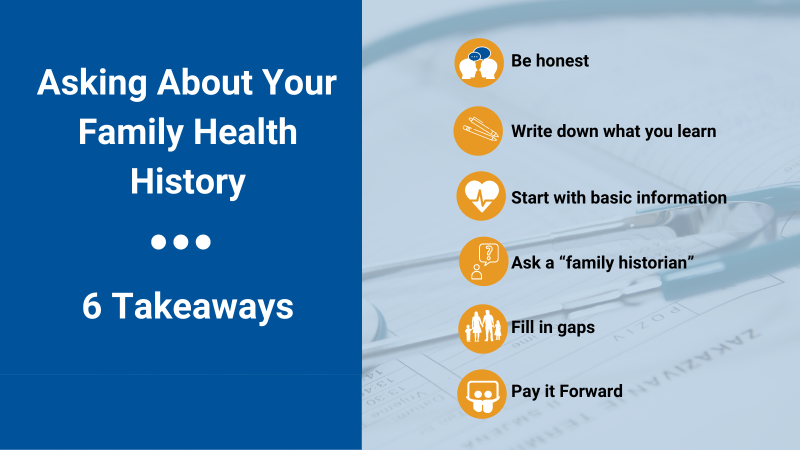
Lori Orlando, MD, MHS, MMCI, Director of the Precision Medicine Program in the Center for Applied Genomics and Precision Medicine at Duke University, recently contributed to the Duke Health blog on family health history. Did You know? Thanksgiving is also National Family Health History Day. Talk to your loved ones this holiday season.
Knowing your family’s health history is one of the most important ways to maintain your health. It can be some of the best information doctors have to understand your risk for developing medical conditions. If you’re seeing family this holiday season, it’s a great time to talk about their past treatments and current medical needs. Asking questions about what’s impacted your loved ones will give you a more complete picture of how your own health may change in the future -- and how your doctor can help.
Why Knowing Family Health History Is Important
Your genetic risk for many diseases may be increased if a parent, grandparent, or close relative had them in their past. For example, if a close relative had colon cancer or pre-cancerous colon polyps, you may be at higher risk. Depending on which relatives were affected and how old they were when diagnosed, you may need to start colon cancer screening at age 40 or even earlier. This is at least 10 years before the standard recommended age of 50. Learning more details about your family health history will help you be proactive about your health with your doctor.
How to Ask About Family Health History
Family members may be reluctant to share personal health information for a variety of personal reasons. Showing genuine curiosity and appreciation for this knowledge can make it easier. Here’s how to start:
- Be honest: Tell loved ones that you want to talk with your doctor about your health and knowing about your family’s wellness will help you be proactive about your health and risk factors.
- Write down what you learn: Whether it’s in a notebook or on a computer or mobile device, documenting information will make it easy to share with your doctor. If you save things digitally, creating a shared document lets you and others update it over time.
- Start with basic information: Record each person’s relationship to you (for example, grandfather, aunt, or brother), their sex, the year they were born, and any conditions they’ve had in the past or have currently. Make sure to ask for the name of any diseases and how old your family member was when they started.
- Ask a “family historian”: This is typically someone who knows the most about you and your relatives. Ask them about their own health history and what they’ve learned from others.
- Fill in gaps: After talking with your “historian,” connect with family members who may be able to share more information about their own health history or other relatives.
- Pay it forward: Share what you’ve learned with family members. This information is not only critical for you, but also can benefit them so they can more accurately understand their risks.
Ask About Specific Health Issues
Your risk for developing some cancers won't be connected to your family's history, but there are others that are more likely to impact you if a relative has been affected. This is especially true for women. Genes linked to breast, ovarian, and uterine cancers can be passed down through generations. Men may be more at risk if family members have had prostate cancer. Both are susceptible to hereditary forms of colon and pancreatic cancer.
Many heart conditions can be hereditary, so ask follow-up questions to learn from family members about specific signs or symptoms, what doctors may have told them, and what their health was like when they were treated.
Diabetes is another common disease that is shared across generations, and while there are many environmental and genetic factors that contribute to rheumatoid arthritis, having a close relative with this condition can increase your risk, too.
After You Gather the Information
Once you’ve collected this information, bring it with you the next time you see your primary care doctor. Your physical exam and lifestyle updates are invaluable to tracking your health, and sharing family details can help align what’s happening with you now and what could take place in the future.
Original article published in Duke Health blog
About Dr. Orlando

Lori A. Orlando, MD, MHS, MMCI, is a Professor of Medicine, health services researcher, and Director of the Precision Medicine Program in the Center for Applied Genomics and Precision Medicine at Duke University. She received her MD from Tulane University in 1998, MHS from Duke in 2004, and MMCI from Duke in 2019. She completed her fellowship, specializing in decision modeling and technology assessments, in 2004. Her research expertise is in decision modeling and implementation science as relates to identifying and managing individuals in clinical settings at increased risk for medical conditions. Her current research program focuses upon using technology to overcome barriers to family health history based risk assessment and using high quality family health histories to guide clinical care.
Orlando is part of a team who developed MeTree, a patient-facing web-based family and personal health history collection and clinical decision support program developed by Duke Center for Applied Genomics and Precision Medicine.